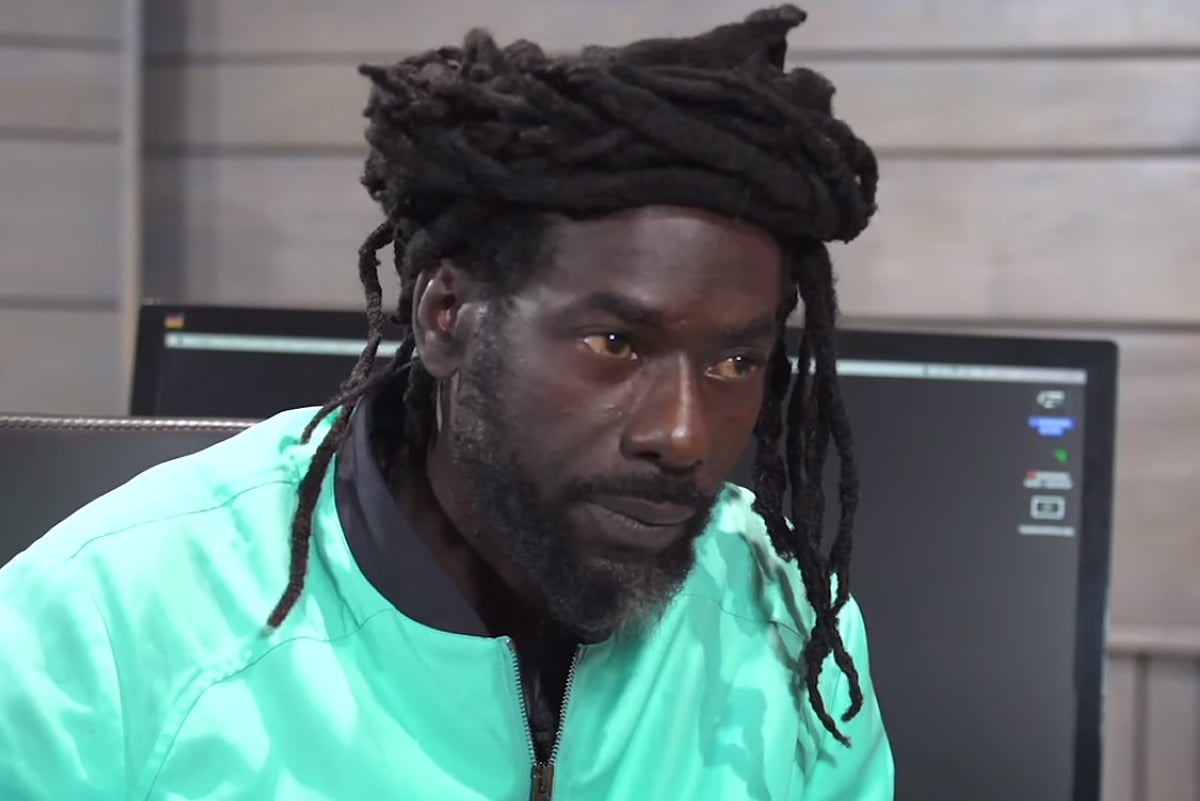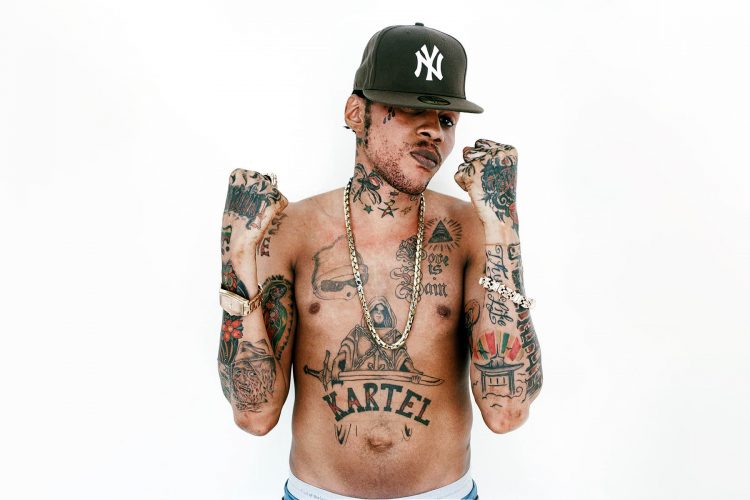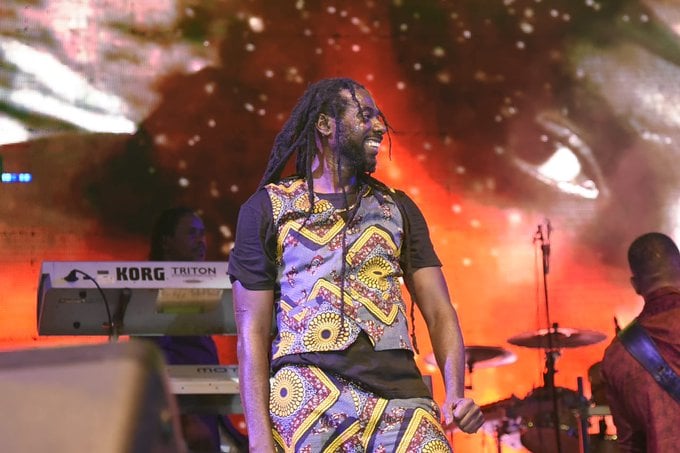Buju Banton Asks Why Vybz Kartel’s Music And Dancehall As A Whole Hasn’t Grown

Buju Banton has offered up his thoughts on Vybz Kartel and the current state of Dancehall. The Grammy award winning entertainer discussed a variety of topics surrounding his career and return to music after his incarceration in a sit down interview with host Winford Williams yesterday on the popular Jamaican programme Onstage TV at Buju’s own Gargamel Studios.
Buju, whose real name is Mark Myrie, said that Vybz Kartel needs to be introspective and the people need to question if his music has grown as much as it could have in the last ten years. While he acknowledged that Kartel’s lyrical content is sound, he questioned if the artiste’s music was still relevant and if so, why hasn’t it grown more around the world.
“Can we honestly say that our music has grown? Can we honestly ask that and say yes? Because me personally feel say it nuh grow.”, he reasoned. “Me come out ah work house (prison) and a Kartel me see run the place, same way. Me hear other people, don’t think me nuh hear and a listen but me know music when me hear music. His lyrical content, that’s not my subject. His relevancy, that’s my argument. That aside has he moved?”, Banton said in the interview.
Buju acknowledged Kartel’s incarceration and questioned why other dancehall artistes have not stepped up to the task of growing genre since Kartel cannot do so from behind bars. “Me nah seh, man nah do dem thing. But the music should have been out there more,” he said in addressing artistes who are not locked up like Kartel is currently.
The two artistes have a little bit of history going back to the early 2000s. In 2002, Buju grabbed the mic from Kartel and publicly disrespected the then upcoming artiste while on stage. After taking the microphone from Buju Bounty Killer defended Kartel, saying: “Gargamel no disrespect but you can’t disrespect the young artist them like that.” Bounty continues: “You have to set example see what me a say. Because him a sing a one tune and him a deejay for the people them and him naan over doing it. Him don’t even get in the chorus anyway no disrespect.” They’ve since had little known contact over the years.

The Steppa singer also addressed the emerging Trap Dancehall trend as detrimental to the genre because it borrows elements of Hip-Hop. “You cannot borrow another man’s sound and claim to be authentic. We never borrow nobody sound. People fly from all over the world fe make Sly and Robbie play drum and base and record it fe put it in a computer. So how come we a borrow people sound now? We don’t do those things, we make music,” he said.
The Gargamel also said that even though the youths seem genuine with their love of Dancehall, laziness will not work in continuing the art form’s progression. He added, Americans look to Jamaica for a different sound and that it was critical that they keep authentic. While he thinks that there must be growth in Dancehall, its base must remain firmly planted in the original form of the music.
Buju questioned if the younger artistes in Dancehall right now understood what it took to become an artiste and the sacrifices that have been made to ensure that Dancehall is a respected genre.
“You had to go into Dancehall and take the mic. You couldn’t tell the selector say, me nah wah dah riddim, gimme a different one”, he explained. He said it’s because you couldn’t demand on selectors that you had to grow a tough skin and then performance became second nature.
Buju also explained that he felt he was a servant of Dancehall and not the King of it, more than likely taking another swipe at Vybz Kartel, who has often declared himself king of the genre.
“When the king come he must readily identifiable but when the servant is there, let it not be said that you didn’t get the message.” This he said is what is contributing to many deejays sounding good on radio but lacking the skill to pull off live performances.
“It important for the culture for you to understand the genesis of it. So when you speak to people about your music, you know from whence it coming.” There is a need for proper representation of Dancehall in Jamaica and education of the younger artistes, he added.
This translates to how people and artistes conduct themselves on social media now, he added. “We losing ourself, upside down.” He said that the data collection was now a tool of “heathens.”
New Album – “Upside Down”
His upcoming album, “Upside Down”, will feature 20 tracks and has a tune for everyone, even the older folks, he continued. Ten of them are for the years he wasn’t around and the other ten are just because he loves his fans. It’s 20 tracks for 2020 because he wants fans to have clear vision, he added in his usual charismatic and humorous style.
His manager Donovan Germain had shared that the artiste would be refraining from new interviews until his new album is out in April. Germain said that then “there (will be) something to talk about other than prison,” which was missing from this Onstage TV interview.
Return to the rock
Banton revealed that he was pleasantly surprised to see the reception he received from the Jamaican people on his return from incarceration in the US. He also shared that he didn’t even want to eat when he got home from his long journey but preferred to “hold a meditation.”
While in jail he said he had a rigorous workout routine which saw him exercising up to three times a day but Buju said when he got home he immediately began working on losing some of the muscle so that he could slim down as being that big was simply “not my style.” He said it was also necessary because it would negatively affect his stage presence. He lost 30 pounds before the start of his Long Walk to Freedom concert.
The first time he walked out on stage in over ten years, was “pure magic,” he said. One of the things that gave him the courage to walk back on the stage and deliver such a magnificent performance at the first installment of the show, at National Stadium, in Jamaica was his pure love of music, which he added “runs deep.”
This love of music he said is shared in Kenya, which he described as a beautiful place. A mammoth crowd had turned out to watch Banton live again at the Kenyatta International Convention Centre in February.

Buju said he has a lot of respect for Afro Beats because the genre pays its respect to its foundation which is Dancehall. He said this is unlike Reggaeton, which he believes stole elements of Dancehall and never tried to find a bridge or pay respect to its original source.
Buju also revealed that he kept his spirit calm and his heart pure to survive the time that he was incarcerated. This he said is what helped him to not lose himself.
Watch the full interview below.
